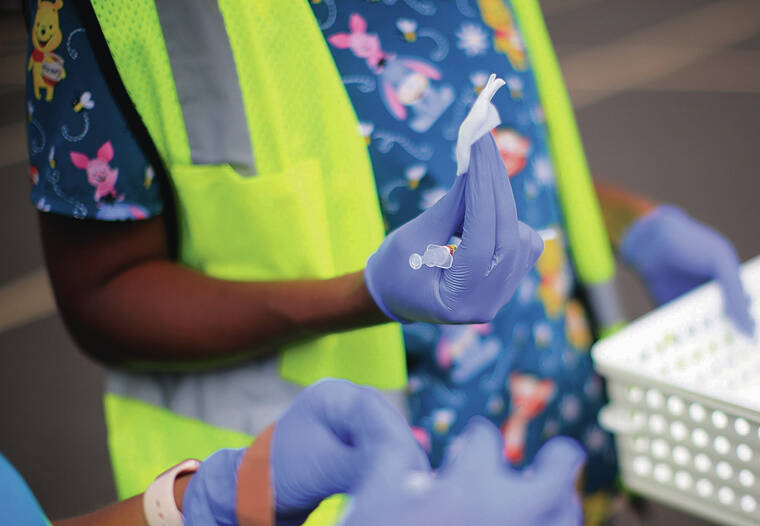The long-awaited COVID-19 vaccines for keiki under 5 years old appear to be on the horizon this summer.
State Department of Health officials have said vaccines for children ages 6 months up to 4 years may be authorized soon, and they are advising parents to ask their pediatricians whether they will offer the vaccine and be ready when they are available.
On Thursday the Biden administration said children under 5 may be able to get their first COVID-19 vaccination doses as soon as June 21, if federal regulators authorize shots for the age group, as expected.
The U.S. Food and Drug Administration has scheduled an advisory committee meeting for mid-June for Moderna’s emergency use authorization request for children ages 6 months to 5 years, and Pfizer’s emergency use authorization request for children 6 months through 4 years of age.
The FDA in February delayed a decision on the Pfizer vaccine as it awaited more data on the effectiveness of a third dose. But Pfizer recently announced three doses of its COVID-19 vaccine offers strong protection for children under 5 and that it had completed its application to the FDA.
Dr. Joy Dalmon, a pediatrician at Kaiser Permanente, said she has already been discussing the issue with parents, and would recommend the vaccinations.
“The truth is the younger kids, yes, statistically, they’re not going to get as sick as older adults,” she said, “but there are young ones that end up in the hospital.”
Last week, for instance, she sent a baby with COVID-19 to the hospital.
The American Academy of Pediatrics said reported COVID-19 cases among children spiked dramatically during the winter omicron surge this year, peaking at 1.15 million cases in the U.S. in one week. For the week ending May 26, more than 112,000 additional child COVID-19 cases were reported, a doubling of case counts from the four weeks prior.
Among states reporting, however, children only made up 1.3% to 4.6% of their total cumulative hospitalizations.
In Hawaii, DOH data show a rising trend for residents ages 17 and under since April, with an average of 450 new COVID-19 cases per 100,000 for the week ending Saturday.
“We know there’s a disease out there that can infect our kids and other people, and we have a prevention that can be safe,” said Dalmon. “We’ve had millions of doses given to children over 5.”
Kids that are immunocompromised and at higher risk should definitely consider getting the vaccine, she said. Dalmon said she would especially recommend them for kids with conditions such as asthma and allergies, those with a history of cancer treatments, and babies born prematurely.
It can also help with summer travel, she said. For parents who have yet to get their older children vaccinated against COVID-19, she would encourage getting that first shot.
“In terms of safety, it’s very good,” she said.
Dalmon said she would also recommend that children ages 5-11 get the Pfizer- BioNTech booster, which was authorized in May, if it has been five months since their primary series.
“It makes sense to get the booster to continue that protection,” said Dalmon. “I do hope families that chose to get vaccinated are motivated to continue to protect their children. Looking at kids and how immunity can wane over time, getting that booster can help.”
Vaccination rates in Hawaii, overall, have hit a plateau even as the surge continues and as more contagious variants take hold in the islands.
As of Wednesday, DOH reported 77.6% of Hawaii’s population had completed the primary series of COVID- 19 vaccines, with 40% boosted and nearly 7% double-boosted.
State health officials estimate that more than 318,000 residents remain unvaccinated against COVID-19.
Among Hawaii children ages 5-11, who have been eligible for vaccines since November, 38% have completed the primary vaccinations, and 1% have been boosted.
Even when vaccines become available for children under 5, only 1 in 5 parents surveyed are eager to get their child vaccinated right away, according to the Kaiser Family Foundation’s vaccine monitor.
Almost 4 in 10 parents, or 38%, of parents with children in the age group said they would “wait and see,” while 27% said they would definitely not get their child under 5 vaccinated.
———
The Associated Press contributed to this report.

